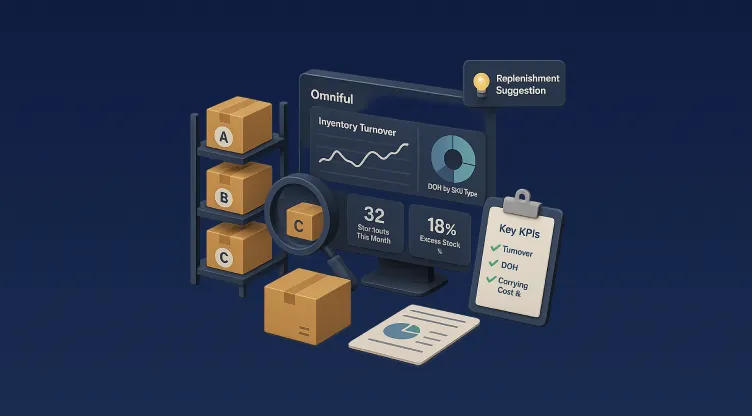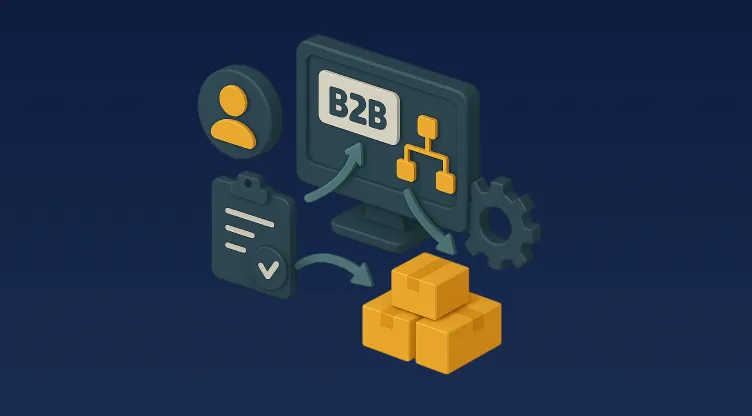Advanced WMS Automations: Transforming Warehouse Operations in MENA

İçindekiler
The Big Picture in Small Bits: What’s Coming Up
- Automating warehouse tasks improves speed, accuracy, and efficiency
- Smart picking algorithms reduce errors and manual decision-making
- Labour scheduling aligns staffing with demand in real time
- Omniful’s Warehouse Management System helps MENA businesses scale
- Learn how retailers in KSA cut order times by 50%
- Internal links to Order Management, Inventory, Returns, and more
Rethinking Warehouse Management in the Digital Era
In a region driven by ambitious initiatives like Saudi Vision 2030 and the UAE’s Smart Government strategy, the supply chain is undergoing a rapid digital transformation. At the heart of this evolution lies the warehouse — not just a place for storage anymore but a hub of intelligent, fast-moving logistics.
With the growth of e-commerce, last-mile delivery, and regional fulfilment networks, legacy warehouse processes can no longer keep up. Delays in putaway, inefficient picking, and mismatched labour availability create costly bottlenecks.
Enter advanced warehouse automation.
Automated Putaway: Where Speed Meets Precision
Automated putaway systems transform how inventory is received and stored. Traditionally, staff rely on manual checks and location decisions. This leads to delays, misplacement, and human errors.
Now, with systems like Omniful’s WMS, automation maps every incoming item to its optimal bin using real-time logic.
How it Works
- Real-time Location Assignment: Systems scan SKU details and assign the nearest or most efficient bin
- Smart Bin Selection: Based on item size, category, expiry date, or frequency of picking
- Mobile Integration: Staff receive location instructions directly on handheld devices (Honeywell, Zebra, Sunmi)
This isn’t just tech for tech’s sake. For MENA’s growing retail and dark store networks, fast putaway allows same-day dispatch, critical for q-commerce and pharma fulfilment.
Business Impact
- 35% faster stock availability
- 60% fewer misplacements
- Better space utilisation using product dimensions
Want to learn how this connects with wider fulfilment? Explore Omniful’s Inventory System.
Smart Picking Algorithms: Precision at Every Step
Picking is the costliest and most time-intensive warehouse function. Mistakes here not only impact customer satisfaction but also eat into margins.
Advanced picking algorithms use AI to optimise routes, minimise movement, and increase accuracy.
Key Capabilities
- Zone-Based Multi-Order Picking: Enables picking items for many orders from the same zone
- Cluster-Based Batch Picking: Combines orders with similar SKUs or delivery paths
- Route Optimisation: Suggests shortest, most efficient paths to collect items
- Barcode Scanning Mandates: Enforces correct item selection using handheld verification
These methods reduce manual decisions and improve output — especially crucial in high-SKU environments like fashion, groceries, or homeware.
Case in Point
A leading Saudi fragrance group reduced order fulfilment time by over 50% by switching from manual to algorithmic picking through Omniful WMS. This meant going from 4–6 days to under 3 hours for local deliveries.
Explore this in detail through our Customer Success Stories.
Labour Scheduling Automation: Human Capital Meets AI
Warehouse labour is often misaligned with demand. Overstocked on quiet days, and underprepared during peak hours — leading to overtime, burnout, and inefficiencies.
Labour scheduling automation uses demand forecasting and task analysis to optimise work assignments.
Features to Look For
- Dynamic Shift Management: Adjusts workforce based on order volume
- Task Prioritisation Engine: Assigns teams based on task urgency, skill set, and availability
- Performance Tracking: Monitors picker efficiency, time spent per task, and throughput
MENA Relevance
GCC countries, where workforce diversity and hourly wage differences are high, benefit from precision in scheduling. Labour-intensive operations like returns, packing, and QC can be automated in terms of resource planning.
Check out our Returns Management System to see how staffing impacts reverse logistics too.
MENA-Specific Warehouse Challenges & How Automation Solves Them
| Challenge | Automation Solution |
|---|---|
| High order volumes during Ramadan & Eid | Auto labour scaling and putaway prioritisation |
| Temperature-sensitive goods (pharma, F&B) | SKU-based putaway rules and expiry tracking |
| Multiple marketplaces (Noon, Amazon, etc.) | Integrated order syncing and barcode compliance |
| Regulatory compliance (ZATCA, SFDA) | Centralised documentation and lot tracking |
| Hyperlocal fulfilment for dark stores | Picking route optimisation and zone batching |
Integrating WMS with Other Core Systems
Warehouse automation thrives when connected with other layers in the fulfilment stack. Omniful’s plug-and-play approach ensures smooth synchronisation.
- Sync with Order Management to prioritise urgent deliveries
- Use Transportation Management to coordinate shipping based on picking status
- Connect Point of Sale for inventory visibility across retail branches
- Automate fulfilment via Shipping Gateway for real-time label generation
- Power reverse flows with Returns Automation
Together, these systems create a digital nervous system for your entire logistics setup.
Why Omniful’s WMS Is Built for MENA
Unlike global WMS providers, Omniful is born in Riyadh and built for the region’s unique challenges:
- Arabic-first UI and RTL support
- Compliant with Saudi ZATCA standards
- Pre-built integrations for Noon, Salla, Zid, and others
- Temperature-sensitive logistics support
- 3PL and dark store compatible
From local SMEs to regional powerhouses like Aramex and Laverne Group, our clients automate faster with minimal tech overhead.
Want to see it in action? Request a Demo.
FAQs About Advanced WMS Automation
What is warehouse automation in WMS?
It refers to using software and hardware to automate manual processes like putaway, picking, and workforce scheduling.
Can automation reduce warehouse errors?
Yes. With scanning mandates, real-time stock updates, and AI-driven logic, error rates drop drastically.
How is labour scheduling automated?
Systems use task volume, peak hour trends, and picker capacity to generate optimal shift patterns.
Is this viable for small to mid-sized warehouses in MENA?
Absolutely. Modular WMS like Omniful start small and scale as you grow.
Can this work with existing marketplaces?
Yes. Omniful integrates with major MENA marketplaces and POS systems out of the box.
Final Thoughts: The Future Is Smart, Automated, and Localised
Advanced WMS automation isn’t just about saving time. It’s about building resilience, agility, and precision in a volatile market. For MENA’s rapidly growing retail and fulfilment sectors, now is the time to go from reactive to predictive.
Automated putaway, smart picking, and AI-led labour scheduling aren’t optional anymore — they’re business-critical.
Are you ready to transform your warehouse into a competitive advantage?























